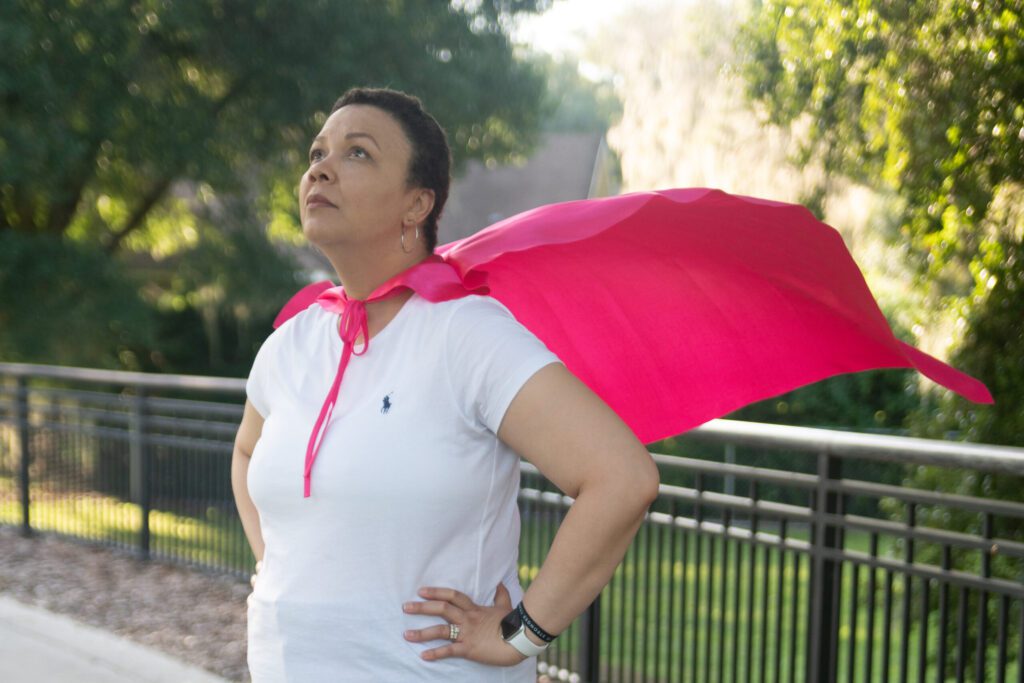How One Woman’s Breast Cancer Brought Her New Perspective
by TIM CRAIG
photos by APRIL SPAULDING
For Toshika Chambers, it was a moment that put everything in perspective.
Sitting in the lobby of her doctor’s office, the Lakeland native and Haines City resident waited for the results of a biopsy. Her mind swirled. A self-described “routine person,” her life revolved around her work, children, and husband. This, the doctor’s office and everything it represented, threatened to derail the routine.
She looked over. She sat next to another woman, sitting in a gown. What are you in for, the woman asked. Chambers told her.
“The woman said that she had just had her breast cancer surgery and proceeded to show me where she had surgery,” remembers Chambers. “Then she looked at me and said, ‘I’m fine, you’re going to be fine, too.’ ”
That was a key moment; it gave Chambers a glimpse of the tough road ahead, but it also put her nerves at ease.
“Thinking back, that moment represented a huge example of the community of support I never knew existed,” she says. “It was my first interaction with a Pink Sister.”
Only a few weeks earlier, Chambers had felt a lump she knew wasn’t supposed to be there. She had turned 40 in 2019 and had scheduled a mammogram earlier in the year, but she had to cancel because of her busy work schedule.
“I thought that as long as I got one before the end of the year, I would be on track,” she said. So when she felt the lump, she didn’t hesitate. She set up the appointment the next day.
That was in early October 2019. The appointment provided clues that the lump was not good. Instead of a mammogram, she had an ultrasound, and the ultrasound appointment lasted 30 minutes.
“I knew it wasn’t good,” she says. “Afterward they told me I needed to go to my doctor and get a biopsy right away.”
She got the biopsy the same week and the results came back quickly: Chambers was diagnosed with triple-negative breast cancer. According to the Susan G. Komen foundation, 15% to 20% of all breast cancers are triple-negative and the tumors are often aggressive.
The treatments started right away at Hollis Treatment Center in Lakeland. It started with six months of chemotherapy, most of which were affected by the rise of the COVID-19 pandemic, bringing its own challenges and, according to Chambers, its own opportunities.
“At the beginning of the chemo phase, I had my husband with me every treatment, but within two months I went from the support and distraction of family to no support,” she said. “You can’t even describe the feeling of dread. There were nurses and they were great, but there’s nothing like family to know how to distract you and get you through the treatment.”
The fear of COVID-19 forced her to consider stopping her treatments for fear of the infection. However, the support of her family and friends gave her the strength to carry on. She also found a new way to distract herself at treatment.
“What helped distract me the most was to get to know the people who were in the room with me,” she said. “I’d start with a smile to see if they were open to talk, and I eventually found myself interacting with a lot of different people I would not have known. They were coming alone to treatment, too, and it allowed us to support each other.”
The interactions forced the self-proclaimed introvert to open up and let others see the struggles she faced, as well as hearing their struggles.
“After the second or third week, it finally sunk in,” she says. “I know the purpose: I had to be vulnerable to share, but that vulnerability allows you to help others. I needed to share my story.”
It helps shape the way she viewed her treatment plan. After the tumor reacted positively to the chemo, Chambers was a candidate for a lumpectomy, and opted for that over a mastectomy. After recovering from the surgery, she started her 30 radiation treatments, 25 rounds of regular radiation, plus five booster rounds.
The first day of radiation was another moment Chambers realized something about herself. When she entered the treatment, she had been told that chemotherapy was the worst to go through, and after chemotherapy, surgery and radiation would be easier.
As she lay on the table, with the nurses were prepping her for her treatment, Chambers found herself overwhelmed with emotion. It came as a surprise. But as she went through it, she found herself equipped to rein in the emotions.
“I felt like, ‘Oh my goodness, what’s going on?’ ” she says. “But I kept telling myself: ‘You got this. You went through chemotherapy. You went through surgery. You are strong.’ ”
Repeating that mantra along the way made her strong enough to handle anything. And, even though it sounds cliché, she says, it rings true. On August 4, she received her final treatment.
“We are so strong. We don’t realize it until we’ve been put to the test.,” she says. “Positivity is the best treatment for cancer. The self-encouragement absolutely got me through.”
Now, as a Pink Sister herself, she is glad to share, not only her experience, but also her triumph with the others who went before and the ones to come.
“Before, I was into working and climbing the corporate ladder, and being there for my family,” she says. “After, your whole perspective changes. Every moment is precious. Work is great, but I also work at building moments with my family, I work at feeling a sense of community. That’s what being in the community of Pink Sisters is about.”
